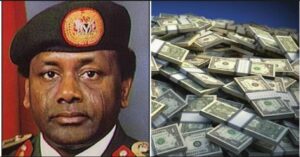Abacha’s loot: Supreme Court refuses to unfreeze accounts in UK, Switzerland, others

The Supreme Court, on Friday, declined to quash Federal Government’s directive that froze various bank accounts that were traced to late former Head of State, Sani Abacha, and his family members, in the United Kingdom, Switzerland, Jersey, Liechtenstein and Luxembourg.
In a unanimous decision, a five-man panel of Justices of the apex court, led by Justice Centus Nweze, dismissed the appeal a brother to the late military dictator, Alhaji Ali Abacha, filed for the family to be allowed access to the bank accounts.
The apex court held that the substantive case that led to the appeal was already statute barred as at April 2004 when it was commenced at the Federal High Court in Kaduna. Though the lead judgement in the appeal marked: SC/359/2010, was prepared by Justice Kudirat Kekere-Ekun, it was however read on Friday by Justice Ejembi Eko. The Supreme Court noted that it had in February last year, dismissed a similar appeal that was brought on behalf of the Abacha family by Alhaji Abba Mohammed Sani.
It held that no fresh reason was adduced in the instant appeal to warrant a different decision with regards to the frozen accounts. More so, the court said it noticed that the appellant in the new appeal was represented by Mr. Reuben Atabo who was equally the counsel that handled the earlier appeal. “No new superior arguments were proferred here to warrant a departure from the decision in the case of Alhaji Sani, earlier decided.
This appeal fails, and it is hereby dismissed”, the court held. Abacha’s brother had approached the apex court to set-aside a judgement the Court of Appeal in Kaduna delivered on July 19, 2010. The appellate court had in a unanimous decision, vacated the September 24, 2004, judgement of Justice Mohammed Liman of the Federal High Court in Kaduna, which was in favour of the Abacha family.
Specifically, Ali had in his substantive suit, challenged an action the administration of former President Olusegun Obasanjo took against the Abacha family in 1999. Former President Obasanjo had through the then Attorney General of the Federation (AGF) and Minister of Justice, Mr. Kanu Agabi, SAN, requested the freezing of all accounts traced to the late Abacha, his family members, relatives and agents in the United Kingdom, Switzerland, Jersey, Liechtenstein and Luxembourg, between 1993 and 1998.
The Nigeria government further requested the Swiss authorities to seize and detain all banking and other documents relating to the affected accounts, charge and prosecute all holders of such accounts, in order to recover and pay over to the Federal Government of Nigeria all monies falsely and fraudulently taken from the government and people of Nigeria.
Also, the government was said to have engaged a foreign financial investigator, Enrico Monfrini of Hauchomann & Bottage in Geneva, Switzerland, to assist in recovering “all looted monies by Gen Abacha and his family members and other public servants and third parties who have used their position or participated as accomplices to misappropriate public funds.”
In his suit, Ali, among other things, prayed the court to void the freezing of the accounts on the grounds that the AGF lacked the powers under the Banking (Freezing of Accounts Act, Cap 29, Laws of Nigeria) under which he claimed to have acted, to request the foreign nations to freeze his accounts and those of the companies in which he is a director. In its judgement, the trial court upheld Ali’s argument and granted all the reliefs he sought. However, following an appeal the Federal Government filed through the office of the AGF, judgement of the trial court was vacated by the Court of Appeal.
In their judgment delivered on July 19, 2010, in the appeal marked: CA/K/71/2005, Justices John Inyang Okoro, Baba Alikali Ba’aba and Mohammed Lawal Garba of the Court of Appeal, Kaduna, held that the suit was statute-barred. The appellate court equally held that the AGF who was the sole Defendant in the matter, was not accorded fair hearing by the high court. Dissatisfied with the decision, Ali Abacha took the case before the Supreme Court, where he also lost the appeal on Friday. Vanguard
